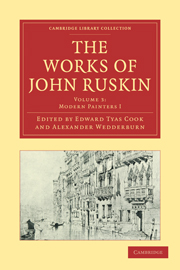Book contents
- Frontmatter
- Contents
- LIST OF ILLUSTRATIONS
- INTRODUCTION TO THIS VOLUME
- BIBLIOGRAPHICAL NOTE
- MODERN PAINTERS VOLUME I
- AUTHOR'S PREFACE TO FIRST EDITION (1843)
- AUTHOR'S PREFACE TO SECOND EDITION (1844)
- AUTHOR'S PREFACE TO THIRD EDITION (1846)
- AUTHOR'S PREFACE TO NEW EDITION (1873)
- AUTHOR'S SYNOPSIS OF CONTENTS
- PART I OF GENERAL PRINCIPLES
- SECTION I OF THE NATURE OF THE IDEAS CONVEYABLE BY ART
- SECTION II OF POWER
- CHAPTER I GENERAL PRINCIPLES RESPECTING IDEAS OF POWER
- CHAPTER II OF IDEAS OF POWER, AS THEY ARE DEPENDENT UPON EXECUTION
- CHAPTER III OF THE SUBLIME
- PART II OF TRUTH
- SECTION I GENERAL PRINCIPLES RESPECTING IDEAS OF TRUTH
- SECTION II OF GENERAL TRUTHS
- SECTION III OF TRUTH OF SKIES
- SECTION IV OF TRUTH OF EARTH
- SECTION V OF TRUTH OF WATER
- SECTION VI OF TRUTH OF VEGETATION.—CONCLUSION
- Appendix
- Plate section
CHAPTER III - OF THE SUBLIME
Published online by Cambridge University Press: 07 September 2011
- Frontmatter
- Contents
- LIST OF ILLUSTRATIONS
- INTRODUCTION TO THIS VOLUME
- BIBLIOGRAPHICAL NOTE
- MODERN PAINTERS VOLUME I
- AUTHOR'S PREFACE TO FIRST EDITION (1843)
- AUTHOR'S PREFACE TO SECOND EDITION (1844)
- AUTHOR'S PREFACE TO THIRD EDITION (1846)
- AUTHOR'S PREFACE TO NEW EDITION (1873)
- AUTHOR'S SYNOPSIS OF CONTENTS
- PART I OF GENERAL PRINCIPLES
- SECTION I OF THE NATURE OF THE IDEAS CONVEYABLE BY ART
- SECTION II OF POWER
- CHAPTER I GENERAL PRINCIPLES RESPECTING IDEAS OF POWER
- CHAPTER II OF IDEAS OF POWER, AS THEY ARE DEPENDENT UPON EXECUTION
- CHAPTER III OF THE SUBLIME
- PART II OF TRUTH
- SECTION I GENERAL PRINCIPLES RESPECTING IDEAS OF TRUTH
- SECTION II OF GENERAL TRUTHS
- SECTION III OF TRUTH OF SKIES
- SECTION IV OF TRUTH OF EARTH
- SECTION V OF TRUTH OF WATER
- SECTION VI OF TRUTH OF VEGETATION.—CONCLUSION
- Appendix
- Plate section
Summary
Sublimity is the effect upon the mind of anything above it
It may perhaps be wondered that, in the division we have made of our subject, we have taken no notice of the sublime in art, and that, in our explanation of that division, we have not once used the word. The fact is, that sublimity is not a specific term,—not a term descriptive of the effect of a particular class of ideas. Anything which elevates the mind is sublime, and elevation of mind is produced by the contemplation of greatness of any kind; but chiefly, of course, by the greatness of the noblest things. Sublimity is, therefore, only another word for the effect of greatness upon the feelings;—greatness, whether of matter, space, power, virtue, or beauty: and there is perhaps no desirable quality of a work of art, which, in its perfection, is not, in some way or degree, sublime.
Burke's theory of the nature of the sublime incorrect, and why.
I am fully prepared to allow of much ingenuity in Burke's theory of the sublime, as connected with self-preservation. There are few things so great as death and there is perhaps nothing which banishes littleness of thought and feeling in an equal degree with its contemplation. Everything, therefore, which in any way points to it, and, therefore, most dangers and powers over which we have little control, are in some degree sublime.
- Type
- Chapter
- Information
- The Works of John Ruskin , pp. 128 - 130Publisher: Cambridge University PressPrint publication year: 2010First published in: 1903



